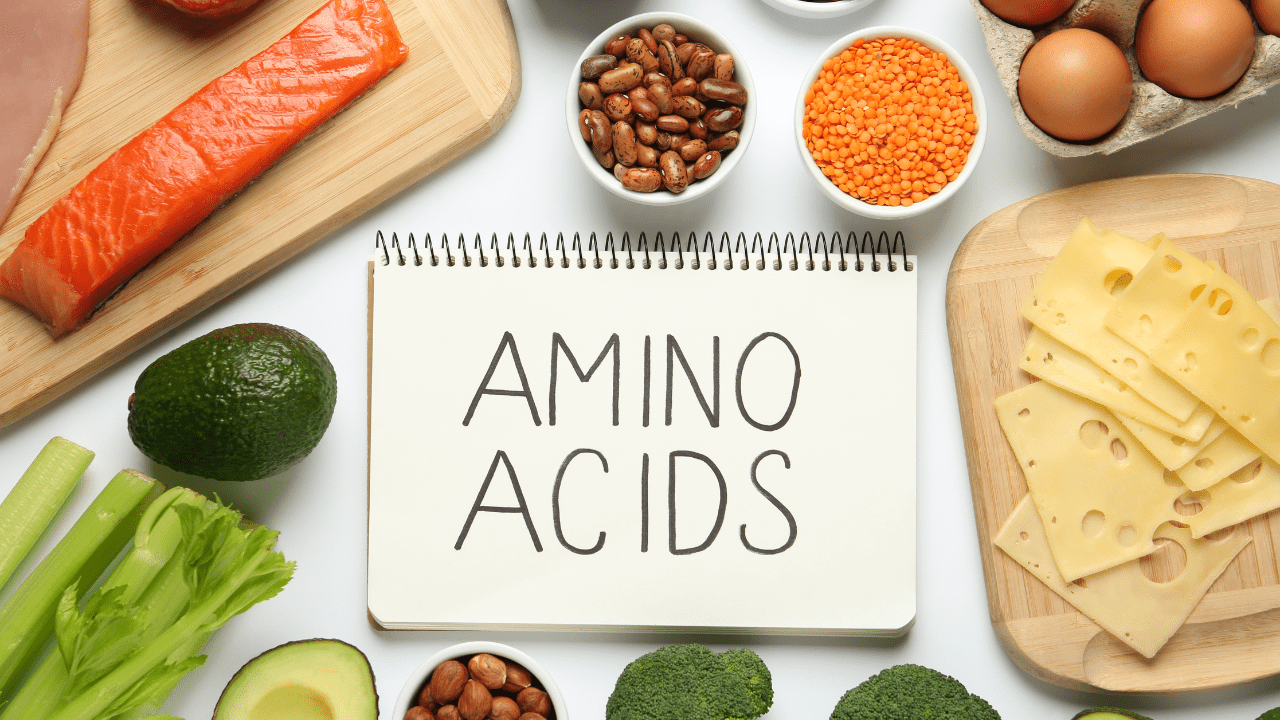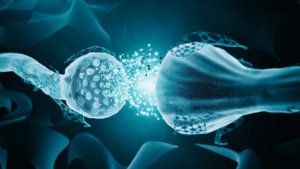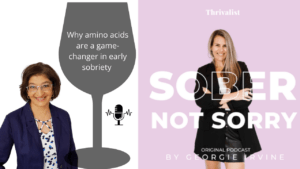Managing Anxiety and Depression with Amino Acids
by Vanita Dahia
Amino Acids are essential for the production of happy and sad brain chemicals. Amino acids have the power of regulating mood, building muscle, detoxyfying the liver and maintaining the microbiome.
Custom Compounded Amino Acids for Stress, Anxiety and Depression
The benefits of taking amino-acids to improve your health can hardly be overstated. All the body tissues – every muscle, hair, nail, enzyme, and brain cell – is made from amino-acids. They are central to the bio-chemistry of your body. They play a major role in nearly every chemical process that affects both physical and mental function.
As a result, amino acids have more diverse functions than any other nutrient group, including:
- Cellular energy production
- Formation of ligaments, tendons, and bones
- Formation of antibodies
- Formation and regulation of enzymes and blood transport proteins
It is possible to ease pain, soothe anxiety, and improve memory
simply by taking amino-acids.
Why Test Amino Acid Levels?
Factors like poor digestion function, improper use of medications such as antacids or acid blockers, increased stress responses, poor eating habits, and aging can affect the body’s ability to provide essential nutrients at a tissue level. As a result, adequate protein intake does not ensure an optimal amino acid supply within your body. Ensuring a balanced and optimal intake of these nutrients becomes critical for prevention as well as treatment of many chronic illnesses.
Testing for energy and mitochondrial function reveals all the options in testing for energy. An in-depth understanding of amino acids can provide essential clues to changes in the body’s physiology.
Importance of Amino Acids
Amino acids are essential for:
- Liver detoxification – specific amino acids are needed for phase 2 conjugations liver detoxification pathways
- Neurotransmitters – the brain produces excitatory and inhibitory brain chemicals from specific amino acids
- Cardiac function – amino acids are required for muscle contractility
- Cartilage, bone health and inflammation – amino acids are required for cartilage build and prevention of osteopenia, osteoarthritis and osteoporosis
- Many organ system function as it is needed for practically all of the body physiology
Measurement of amino acid levels (serum or urine) can provide valuable information about the overall status of your essential amino acid availability. Recognizing your biochemical individuality is a key factor in increasing chances for therapeutic success. Evaluation of amino acids allows for a treatment plan individualized to your unique needs.
The amino acid blends, specially compounded, are a blend of specific amino acids only – without any adulterants. Commercially available protein powders vary in potency and contain bulking agents, flavors and preservatives.
Custom tailored amino acids are pure amino acids – no additives. To optimize transamination of amino acids, biosynthesis and metabolism of amino acids, we need cofactors of Magnesium and B-group vitamins.
When taking a custom compounded Amino Acid complex, take Magnesium with B-vitamins to assist with utilisation, synthesis and metabolism of Amino Acids.
Amino Acids for Mental Health
- Communication within the brain & between the brain & the rest of the nervous system occurs through chemical “languages” called neurotransmitters. The central nervous system is almost completely regulated by amino acids & peptides.
- Serotonin, the happy hormone is synthesized from amino acid Tryptophan and essential cofactors, Iron, Tetrahydrobiopterin and Vitamin B6.
- Dopamine, your reward hormone is synthesized from amino acids, phenylalanine and tyrosine together with essential cofactors Iron, Tetrahydrobiopterin and Vitamin B6.
- GABA, the calming neurotransmitter is synthesized from amino acids, phenylalanine and tyrosine together with essential cofactors Iron, Tetrahydrobiopterin and Vitamin B6.
Key Players in Production of Neurotransmitters
GABA
- Anxiety neurotransmitter
- Functions as the major inhibitory neurotransmitter
- Induces relaxation and reduces anxiety
Serotonin
- Happy hormone
- Serotonin is the “housekeeping” molecule – promotes healthy sleep, regulates appetite, improves mood, supports healthy digestive function and so much more
Dopamine
- Reward and pleasure neurotransmitter
- Serves as a messenger of the sympathetic nervous system in the periphery providing satisfaction and excitement in life
Adrenaline and Noradrenaline
- The fight, fright, freeze neurotransmitters
- Serves as a coping messenger to the adrenal and stress response system
Glutamate
- Excitation, behavior and considered as a neurotoxin functions as the major excitatory neurotransmitter and metabolic fuel throughout the body
PEA
- Excitatory neurotransmitter derived from phenylalanine
- Serves as a biomarker for ADHD, OCD
Histamine
- Implicated in allergy, indigestion and depression
- A neurotransmitter and immuno-modulator
Glycine
- Calming amino acid
- Supporting GABA plays a dual role as a neurotransmitter and an amino acid that serves as a building block to proteins
Taurine
- An amino acid that increases glycine and GABA to calm the brain and ease anxiety
- Protects the brain by reducing the harmful effects of excess glutamate
Lysine
- Reduces stress cortisol
- Blocks receptors involved in stress response
Methionine
- Methylation support for folate and SAMe pathways
Inositol
- Stimulates production of the \”feel-good\” hormones serotonin and dopamine
- improve depression, anxiety, and other mental disorders
Theanine
- Relaxing agent for stress and anxiety
- Enhances cognitive performance, improved attention, used as an adjunctive treatment of obsessive-compulsive disorder (OCD) and schizophrenia
AAKG
- Increases blood flow to brain , heart and muscles
- Increases production of nitric oxide and enhancing blood flow to muscles
Testing for Levels of Key nutrients in Stress, Anxiety or Depression
Doctors use a series of questions to determine your type of mental health imbalance or disorder. One of the major accredited questionnaires used is the Diagnostic and Statistical manual (DSM).
Neurotransmitters can also be identified by a simple urine test. Neurotransmitter testing identifies:
- Inhibitory Neurotransmitters – Serotonin and GABA
- Excitatory Neurotransmitters – Dopamine (can be inhibitory), PEA, Histamine, Adrenaline and Noradrenaline
- Amino Acids needed for neurotransmitter production
- Neurotransmitter metabolites to identify how the brain chemicals are excreted from the body after been used up
What needs to be Measured to Identify Imbalances in Mental Health?
- Neurotransmitters to measure “happy and sad” brain chemicals
- Stress Hormones identifies the degree of stress i.e. insufficiency or exhaustion with Cortisol and DHEA
- Kryptopyrroles if mental health runs in the family
- Pfeiffer profile if nutrient depletion, copper excess, histamine, Vit D and ceruloplasmin imbalance is suspected
- Advanced methylation genetics identifies the gene markers associated with methylation defects
- Amino Acids identifies the precursors to neurotransmitters and others which impact the body’s physiology
- Neurogenomics identifies the genetic polymorphisms associated with your predisposition to mental health concerns
- Pharmacogenomics identifies which prescription medication is best suited for the type of mental health concern i.e. anti-depressant or mood stabilizer
- Organic Acids to identify mitochondrial ability to produce ATP, the super energy the body produces from consumed food
- The Gut Microbiome to restore the gut-brain axis
- Sex hormones and Thyroid status lays a direct role in moods
Typical Lab Results in Mental Health Conditions
Mood swings
Low serotonin, low thyroid, low GABA, high dopamine, low adrenals
Insomnia
Low adrenals, low serotonin (poor sleep onset), low GABA (poor sleep latency), high Noradrenaline, high adrenaline, low blood sugar, high cortisol. Imbalances in Glutamate, Histamine, Dopamine, GABA and Serotonin are often linked to sleep disturbances and insomnia.
Chronic Fatigue
Low thyroid, low glutamate, low adrenals, low dopamine, low Noradrenaline, low adrenaline. An imbalance between excitatory and inhibitory neurotransmitters can lead to persistent fatigue.
Anxiety
Low serotonin, low GABA, high Noradrenaline, high adrenaline, high glutamate, high cortisol
Impulsivity
GABA, Dopamine and Serotonin are three chemical messengers commonly linked to disorders like ADD, ADHD & OCD
Depression
Low serotonin, low thyroid, low Vitamin D, low Noradrenaline, high glutamate
Pain
Low serotonin, low vitamin D, low cortisol, high Noradrenaline
Lack of motivation
Low serotonin, low dopamine
Weight gain
Low thyroid, high or low Cortisol, insulin resistance
Carbohydrate cravings
Low serotonin, insulin resistance, low dopamine
Memory loss and lack of focus
Low thyroid, low cortisol, low dopamine, low Adrenaline, low Noradrenaline, low glutamate
PMS or PMDD
Imbalances in Serotonin, Dopamine, Norepinephrine and GABA are often involved in cases of PMDD (pre-menstrual dysphoric disorder) and severe PMS
Filling up the tank
Filling up the tank with nutrients that naturally make neurotransmitters to alleviate and manage mood disorders is essential as we make our own neurotransmitters daily.
When using a prescription medication like an SSRI (selective Serotonin reuptake inhibitor) does not “fill the tank”. Instead SSRI’s suppress the reuptake of neurotransmitter, Serotonin.
Neurotransmitters work in harmony with other brain chemicals much like a well-tuned orchestra. When Serotonin is restored with medication, it may throw out the levels of other neurotransmitters. This is why an SSRI may work well initially but cause anxiety or aggravated depression later down the line.
Compounded AMINO-ACID STRESS BLEND is a targeted blend of specific amino acids aimed at optimizing the very neurotransmitters needed for good mood and sound mental health. Custom Compounded Amino Acid Stress Blend is a combination of Glutamine, Methionine, Tyrosine & Phenylalanine, Lysine, Inositol, Theanine and Glycine.
Your formula may be potentized with GABA, Taurine, Histidine, PEA, Tryptophan or AAKG depending on the physiological needs that is established through consultation and assessments with lab testing.
Amino acids, such as tryptophan, phenylalanine, and methionine, can influence pain threshold, mood, and sleep patterns.
Phenylalanine converts to the neurotransmitter tyrosine and to the adrenal catecholamine, noradrenaline (NA), both of which influence mood and behavior.
Phenylalanine is able to prevent the breakdown of endorphins (morphine-like substances produced by the adrenal glands, the body’s natural pain killers. One controlled trial found that phenylalanine worked as well as imipramine, while another found it to be effective for women with premenstrual low mood.
The amino acids, Tyrosine, Methionine and Phenylalanine, are critical at this point, as without these amino acids, your brain would not be able to produce all the adrenalin it needs to help you respond to stress.
Tyrosine is a product of phenylalanine and is one step along the metabolic pathway that leads to adrenaline, encouraging the stress response. Tyrosine appears to prevent the behavioral depression and hypothalamic Noradrenaline depletion observed following an acute stress and to suppress the rise in plasma cortisol.
Tyrosine is also needed to synthesize thyroid hormones. If you have thyroid imbalance, you are likely to feel less motivated or satisfied, typical signs of low Dopamine.
The primary brain fuel is Glutamine, employed to rid the brain of excess ammonia, a poisonous natural chemical via the urea cycle. Glutamine, also known as “brain food” has shown promise in the treatment of depression. Glutamine is used to assist in overcoming symptoms associated with jet lag, exam pressure, difficulty in concentration, and lack of enthusiasm.
Methionine is a precursor to SAMe (responsible for converting noradrenaline to adrenaline) and removes excess histamine (an inhibitory neurotransmitter).
Glycine, derived from Serine and Threonine, is an inhibitory neurotransmitter. Glycine deficiency is associated with manic depression and hyperactivity.
Amino-Acid Supplements are Safe, Simple, and Unequaled Among Natural Substances for their Health-Enhancing Potential
Where to start with having a custom treatment for Stress, Anxiety or depression compounded for you
- Complete the DASS questionnaire to determine which is more dominant – stress, anxiety or depression
- Consult with a health professional to determine the right test for you
- Test for neurotransmitters and the appropriate lab test
- Consult with a health professional to understand tour lab reports and establish the right nutrients, herbs, or amino acids for your mental health
- Get your prescription custom targeted for you based on your clinical picture and lab reports
- Consult with your health professional to tweak your nutrient prescription over time.
Most mental health conditions change over time. You may be depressed during particular period of time of your life. Most sufferers do not need to use anti-depressants indefinitely.
Of course, some mental health conditions require complex administration of prescription medications.
Educational Webinar
How Amino Acids help Anxiety and Depression
Amino acids are primary curators of mediation between management of anxiety and depression and neurotransmission in the brain. After all, amino acids are the starting point in production of happy and sad brain chemicals like serotonin, Dopamine and GABA.
In this webinar, you will learn:
- Which amino acids are needed for neurotransmitter production?
- What dose and how frequency are they needed?
- How do amino acids work in other organ systems which impact mood?
- How do they work with prescription medication?
- The dynamic orchestration of amino acids in neurotransmitter balance
- Role of amino acids in synthesis of neurotransmitters
- Interpreting labs and targeted personalized amino acid therapy
Used Wisely, Amino Acids are Miracles Of Nature
Learn more in Alchemy of Amino Acids Book






